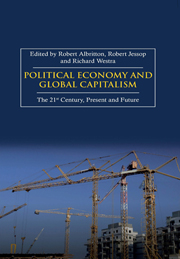Book contents
- Frontmatter
- Contents
- List of Abbreviations
- Notes on Contributors
- Introduction: Political Economy and Global Capitalism
- Part 1 Political Economy of the Present
- Introduction
- 1 Theorizing the Contemporary World: Robert Brenner, Giovanni Arrighi, David Harvey
- 2 Technological Dynamism and the Normative Justification of Global Capitalism
- 3 Eating the Future: Capitalism Out of Joint
- 4 What follows Neo-liberalism? The Deepening Contradictions of US Domination and the Struggle for a New Global Order
- 5 Monetary Policy in the Neo-liberal Transition: A Political Economy Critique of Keynesianism, Monetarism and Inflation Targeting
- Part 2 Political Economy of a Progressive Global Future
- Index
1 - Theorizing the Contemporary World: Robert Brenner, Giovanni Arrighi, David Harvey
from Part 1 - Political Economy of the Present
Published online by Cambridge University Press: 05 March 2012
- Frontmatter
- Contents
- List of Abbreviations
- Notes on Contributors
- Introduction: Political Economy and Global Capitalism
- Part 1 Political Economy of the Present
- Introduction
- 1 Theorizing the Contemporary World: Robert Brenner, Giovanni Arrighi, David Harvey
- 2 Technological Dynamism and the Normative Justification of Global Capitalism
- 3 Eating the Future: Capitalism Out of Joint
- 4 What follows Neo-liberalism? The Deepening Contradictions of US Domination and the Struggle for a New Global Order
- 5 Monetary Policy in the Neo-liberal Transition: A Political Economy Critique of Keynesianism, Monetarism and Inflation Targeting
- Part 2 Political Economy of a Progressive Global Future
- Index
Summary
It is widely recognized that the past three decades mark a significant break with the social, political, economic and cultural order that characterized the decades following World War II. Basic changes include the weakening and transformation of welfare states in the capitalist West, the collapse or fundamental metamorphosis of bureaucratic party-states in the communist East, and the undermining of developmental states in what had been called the Third World. More generally, recent decades have seen the weakening of national, state-centred economic sovereignty and the emergence and consolidation of a neo-liberal global order. Social, political and cultural life has become increasingly global, on the one hand; on the other hand, they have become increasingly de-centred and fragmented.
These changes have occurred against the background of a lengthy period of stagnation and crisis: since the early 1970s, the growth of real wages has decreased dramatically, real wages have remained generally flat, profit rates have stagnated, and labour productivity rates have declined. Yet, these crisis phenomena have not led to a resurgence of working class movements. On the contrary, the past decades have seen the decline of classical labour movements and the rise of new social movements, often characterized by the politics of identity, including nationalist movements, movements of sexual politics and various forms of religious ‘fundamentalism’. Trying to come to terms with the large-scale transformations of the past three decades, then, entails addressing not only the long-term economic downturn since the early 1970s, but also important changes in the character of social and cultural life.
- Type
- Chapter
- Information
- Political Economy and Global CapitalismThe 21st Century, Present and Future, pp. 7 - 24Publisher: Anthem PressPrint publication year: 2007
- 1
- Cited by

